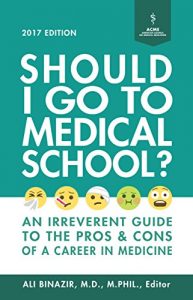People decide to go to medical school for all kinds of reasons, most of them bad, some downright terrible:
• "My parents want me to be a doctor"
• "Ummm, seemed like a better idea than law school?"
• "Prestige, yo!"
• "Girls are into doctors, man"
• "Cashmoney make it rain, baby"
• "Job security! I'll always have a job, and nobody can fire me"
• "I wanna help people!"
• "Couldn't think of anything else to do with my life"
Wrong, wrong, wrong and so wrong. But hey, I don't blame you, grasshopper. 'Cause you've never been a doc. How can you possibly know what it's like? Like parenting, nobody really knows what they're getting into until they've done it themselves.
That's why you need to hear from the people who've already been through the experiences you're seeking to have -- namely, the med students and doctors who have contributed the 70 or so short pieces to this book.
You’ll hear from the disillusioned orthopedist of 14 years; the guy who goes to med school after 10 years in the military; the chief resident who quits in his final year; the 58-year old cardiologist with heartache; the blissfully content rural doc; the 35-year old obstetrician/gynecologist who suddenly feels stuck and can’t escape; med students, residents, and dozens more, from both the pro and con contingents. This way, you get a flavor for what a medical career is like in each phase of training and practice.
Of course, you could just go through medical school and gather your own data. But I'm guessing that listening to the experiences of others would be more cost-effective. $250,000 and eight years, vs nine bucks and a couple of hours. Your pick.
The book has eight sections:
1) “Should you or shouldn’t you,” is the introduction and my essays.
2) “The Voice of Reason,” featuring balanced, well-reasoned pieces on what it means to be a doctor, with both the pluses and minuses. All but one of these come from practicing physicians.
3) Pieces from medical students, residents and practicing physicians who are against a medical career.
4) Med students and practitioners pro a medical career.
5) Lifestyle and relationship issues in the context of a medical career.
6) Long-form interviews with two practicing physicians. One interview is with Dr Dean Ornish, a well-known physician and an eloquent proponent of medicine if there ever was one. The other is with Dr Ashvin Pande, interventional cardiologist and an old friend of mine.
7) Alternatives to medicine: naturopathy, physical therapy, pharmacy, physician’s assistant, research, nurse practitioner, osteopathy, veterinary school, biomedical engineering.
8) Further resources: links to other books, videos and articles you may find useful.
Preview some of the book by clicking on the "Look Inside!" button in the upper left corner of this page, or download a sample. And if you can think of someone who's in the midst of this big decision, send them the link to this page -- it could change the course of their life.
• "My parents want me to be a doctor"
• "Ummm, seemed like a better idea than law school?"
• "Prestige, yo!"
• "Girls are into doctors, man"
• "Cashmoney make it rain, baby"
• "Job security! I'll always have a job, and nobody can fire me"
• "I wanna help people!"
• "Couldn't think of anything else to do with my life"
Wrong, wrong, wrong and so wrong. But hey, I don't blame you, grasshopper. 'Cause you've never been a doc. How can you possibly know what it's like? Like parenting, nobody really knows what they're getting into until they've done it themselves.
That's why you need to hear from the people who've already been through the experiences you're seeking to have -- namely, the med students and doctors who have contributed the 70 or so short pieces to this book.
You’ll hear from the disillusioned orthopedist of 14 years; the guy who goes to med school after 10 years in the military; the chief resident who quits in his final year; the 58-year old cardiologist with heartache; the blissfully content rural doc; the 35-year old obstetrician/gynecologist who suddenly feels stuck and can’t escape; med students, residents, and dozens more, from both the pro and con contingents. This way, you get a flavor for what a medical career is like in each phase of training and practice.
Of course, you could just go through medical school and gather your own data. But I'm guessing that listening to the experiences of others would be more cost-effective. $250,000 and eight years, vs nine bucks and a couple of hours. Your pick.
The book has eight sections:
1) “Should you or shouldn’t you,” is the introduction and my essays.
2) “The Voice of Reason,” featuring balanced, well-reasoned pieces on what it means to be a doctor, with both the pluses and minuses. All but one of these come from practicing physicians.
3) Pieces from medical students, residents and practicing physicians who are against a medical career.
4) Med students and practitioners pro a medical career.
5) Lifestyle and relationship issues in the context of a medical career.
6) Long-form interviews with two practicing physicians. One interview is with Dr Dean Ornish, a well-known physician and an eloquent proponent of medicine if there ever was one. The other is with Dr Ashvin Pande, interventional cardiologist and an old friend of mine.
7) Alternatives to medicine: naturopathy, physical therapy, pharmacy, physician’s assistant, research, nurse practitioner, osteopathy, veterinary school, biomedical engineering.
8) Further resources: links to other books, videos and articles you may find useful.
Preview some of the book by clicking on the "Look Inside!" button in the upper left corner of this page, or download a sample. And if you can think of someone who's in the midst of this big decision, send them the link to this page -- it could change the course of their life.












